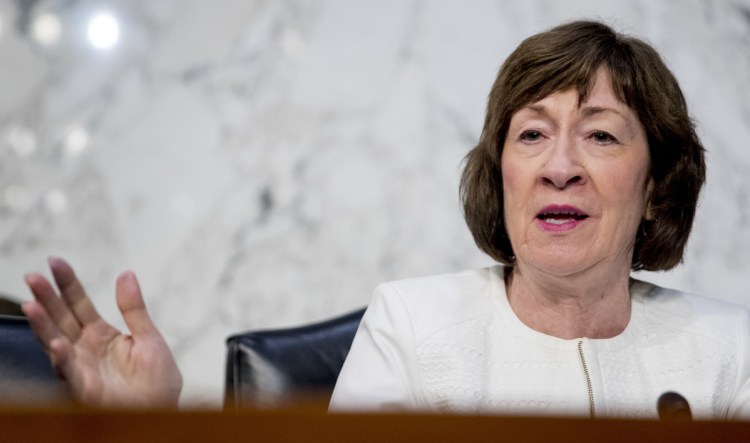Maine Sen. Susan Collins, one of a handful of Republicans involved in negotiations to broker a deal that would end a three-week government shutdown, said Friday that she would oppose any plan by President Trump to declare a national emergency to fund a border wall.
Collins said she believes lawmakers can still find a compromise, and said she hopes to persuade some Democrats to join her small group of senators in crafting a solution that will earn White House approval.
“I understand (Democrats’) belief that there shouldn’t be negotiations as long as government is shut down, but it seems we’re past that point,” Collins said in a phone interview with the Press Herald.
The government has been shut down since Dec. 22 because of the president’s insistence that any budget bill include billions of dollars for a wall along the southern border.
Democrats, who this month took back control of the U.S. House, have refused to cave to Trump’s demands.
The Republican-led Senate has so far sided with Trump, but it is facing mounting pressure.
Trump, meanwhile, has continued to make his case for a wall. On Tuesday, he delivered primetime remarks to the nation from the Oval Office, repeatedly using the word “crisis,” to describe what’s happening at the border.
On Thursday, he visited the border city of McAllen, Texas, to meet with agents and talked at length about the possibility of declaring a national emergency in order to end the stalemate.
Sen. Lindsay Graham of South Carolina, who is leading the group of Republicans that includes Collins, has encouraged Trump to do so, but Collins said that would be the wrong move.
“For the president to invoke the National Emergency Act of 1976 would be an extraordinary step and I believe it would be of dubious constitutionality,” she said, adding that such a move would be instantly challenged in court, likely leading to an injunction that wouldn’t end the shutdown.
Collins also said for the president to consider taking funds that already have been appropriated for specific purposes, such as disaster relief, and using them for unrelated purposes would be a violation of the separation of powers.
She had been hopeful that the proposal her group brought to Vice President Mike Pence on Thursday might be a break-through, but the president rejected it.
“What we have, unfortunately, are two individuals in charge, the president and the (House) speaker (Nancy Pelosi), who are both absolutely un-budging in their positions,” Collins said. “That makes it extremely difficult to resolve.”
Once the Senate adjourned for the day early Friday afternoon, it ensured that the current shutdown will be the longest on record. Friday also was the first day that hundreds of thousands of federal workers did not get their paychecks.
Collins said her sense is that Mainers are increasingly frustrated over the impasse. She shared a story about talking with a Transportation Security Administration agent this week who was worried about working without a paycheck and whether she could support her daughter.
“This will start to have a ripple effect, affecting more and more Mainers and Americans in general, and further lowering the public’s confidence in government,” Collins said. “This is very serious and has a real impact on people.”
She did say she was pleased the Senate passed a bill she co-sponsored with Sen. Ben Cardin, D-Maryland, to ensure federal employees received full back pay, but said many workers can’t live with the uncertainty of when that money might come to them.
Collins was part of a bipartisan group of senators who helped end a 16-day shutdown in 2013 during President Obama’s second term. This time around, many in the group who are negotiating with the White House, including Collins, are up for reelection in 2020. Collins has not yet said whether she plans to seek a fifth term.
Maine’s other senator, independent Angus King, has opposed the shutdown from the beginning and Friday he referred to the protracted fight as a “hostage situation.” In remarks on the Senate floor, he urged colleagues to pass a veto-proof budget for everything but border security and then work on a compromise.
If the Senate fails to check Trump, King said, “This will become the go-to tactic for this administration and probably for future administrations. We will set a precedent that will haunt this institution for years to come.”
King also criticized the president for framing the debate in black-and-white terms.
“There is no one in this body who is for open borders,” he said.
The senator, who was reelected to a second term in November, said it’s near impossible to negotiate with the White House on this issue because their position “changes day to day.”
Finally, King said Trump’s insistence on referring to the situation at the border as a crisis “is really hard to reconcile with reality.”
“The vast majority of people coming to the border today are not looking to sneak across but to be asylum seekers,” he said. “They are not illegal immigrants, they are availing themselves of American law. The wall has nothing to do with them.”
Collins did not use the term “crisis” to describe the border, but she did say that there is clearly a problem that needs to be addressed.
“I’m not saying we don’t need to strengthen our security at the border, but a shutdown is not the way to do it,” she said.
Eric Russell can be contacted at 791-6344 or at:
Twitter: PPHEricRussell
Send questions/comments to the editors.


